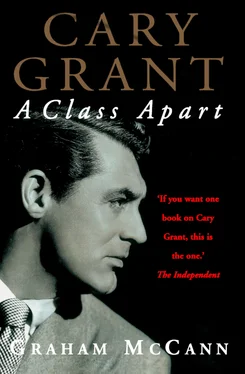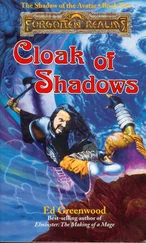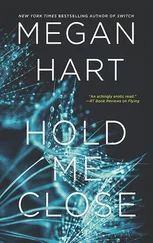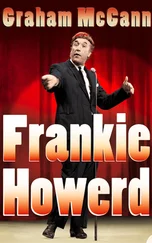While he was playing some short engagements in and around New York, he met Reginald Hammerstein, a stage director and the younger brother of Oscar Hammerstein II, who suggested, somewhat impetuously, that his true talent might lie in musical comedy. Receptive to the idea, Leach took voice lessons and was engaged on a ‘run-of-the-play’ basis by Arthur Hammerstein, Reginald’s uncle, for Golden Dawn , the opening production of the impressive new Hammerstein Theater. 37 Leach had a minor role as an Australian prisoner of war, and doubled as understudy of the juvenile lead. The production opened on 30 November 1927, and ran for 184 performances over a six-month period. Afterwards, Arthur Hammerstein re-engaged him for another musical, Polly , in the role that Noël Coward had taken in the London production.
Polly opened to largely negative reviews in Wilmington, Delaware, where one critic remarked that ‘Archie Leach has a strong masculine manner, but unfortunately fails to bring out the beauty of the score’. 38 Leach was replaced before the show reached Broadway. He was not, however, out of work for too long. Marilyn Miller, the popular musical comedy star, chose him to replace her current leading man in Rosalie . The show’s producer, Florenz Ziegfeld, agreed with the choice and asked Arthur Hammerstein – his arch-rival – to release Leach from his contract. Hammerstein was not at all pleased, and, over Leach’s ‘complaining voice’, 39 sold the contract to J. J. Shubert instead.
Shubert, along with his brother Lee, was Broadway’s biggest theatrical producer at the time. 40 Ironically, although Leach, impetuously, had tried to resist the move, the change could hardly have done his career more good. Within a few weeks, the Shuberts had cast him in a new musical, Boom Boom , with Jeanette MacDonald, and agreed to pay him $350 per week. For a young performer who had been in only two previous productions, one of which he had been fired from, this was a stroke of remarkably good fortune. Leach, to his credit, appreciated this fact, and worked hard to make a success of the role. The show opened in New York at the Casino Theater in January 1929. After a mere seventy-two performances it closed (Charles Brackett, The New Yorker’ s critic, remarked acidly that Boom Boom could ‘teach one more about despair than the most expert philosopher’ 41 ), but both MacDonald and Leach were screen-tested at Paramount’s Astoria Studio, 42 though no contracts were offered. Leach’s test was not positive; he was, according to the talent scout’s report, ‘bowlegged and his neck is too thick’. 43 This curt dismissal was not quite as injudicious as the now notorious verdict on Fred Astaire’s first screen test: ‘Can’t act. Slightly bald. Can dance a little.’ 44 There was, after all, no shortage of young, tall, good-looking would-be matinee idols seeking employment in Hollywood; the competition was great, and any blemish, any sign of a suspect temperament, could count against one. Archie Leach, at that time, was far from Hollywood’s – or, indeed, his own – idea of perfect, and he had not yet learned how to make a virtue out of his distinctive features and mannerisms. The talent scout was not guilty of any gross exaggeration. Leach’s collar-size was 17½ inches, 45 and, because he had a gymnast’s narrow, sloping shoulders, the thickish neck could sometimes seem even thicker than it actually was. He did indeed have a slightly bow-legged gait, which was not uncommon among those trained in his kind of specialised acrobatic work. The depressing verdict, therefore, was probably not entirely unexpected.
It was some consolation to Archie Leach that he was kept, in his words, ‘happily, gainfully and steadily employed’ by the Shuberts for almost three years. 46 He was, in fact, doing about as well in the theatre at that time as he would have done with comparable work in Hollywood. The Shuberts were paying him $450 per week, which allowed him to purchase his first car, a Packard sport phaeton, then considered one of the finest of American-made automobiles. He was a young man who was sharply aware of the value of appearances. ‘That was my trouble,’ he recalled, ‘always trying to impress someone.’ 47
His next stage role was as Max Gunewald, a vain, superficial young man, in A Wonderful Night , Fannt Mitchell’s rather loose re-working of Johann Strauss’s Die Fledermaus . It opened at the Majestic Theater on 31 October 1929, two days after the blackest day of the Wall Street Crash, and closed, promptly, in February 1930. It had received mixed reviews, as had Archie Leach. One critic wrote, somewhat gnomically, that ‘Mr Archie Leach, as the soprano’s straying baritone, brings a breath of elfin Broadway to his role’, but another disagreed, claiming that Leach, ‘who feels that acting in something by Johann Strauss calls for distinction, is somewhat at a loss as to how to achieve it. The result is a mixture of John Barrymore and cockney.’ 48
After a few weeks back working in vaudeville, Leach received a new assignment from the Shuberts, but at a somewhat reduced salary. On the verge of bankruptcy, the Shuberts were packaging streamlined versions of some of their earlier successes to offer to the public at ‘pre-war prices’ from three dollars down to fifty cents. Leach went on tour in the musical The Street Singer,49 for the next nine months, he toured through the provincial towns where unemployment was starting to put many people out on the streets. The show had to gross two thousand dollars a night just to break even. It failed, and was one of the contributing factors that caused the Shubert Corporation to file for receivership in 1931.
That year was the most dismal one for legitimate theatre in the US for two decades. Almost half of all Broadway theatres were closed. The only work that Archie Leach could find was at the open-air Municipal Opera in St Louis, Missouri, where J. J. Shubert produced a summer-long series of musical revivals. Although Cary Grant later recalled the 8,000-seat amphitheatre in Forest Park as being ‘delightful’, 50 and the summer season as ‘glorious’, 51 it was gruelling work, with a new role to be learned every two weeks. The plots were often extravagant, the productions lavish and the lighting effects, in particular, were spectacular. Audiences were rather less discriminating than on Broadway, but they appreciated professional performances. Leach, usually playing the romantic lead, stood out as a darkly handsome young man. Local reviews were generally positive. He was noticed. When the season ended, and Leach returned to New York, he was invited to appear in a one-reeler movie entitled Singapore Sue . He was engaged on 8 May 1931, 52 for six days, by the Paramount Public Corporation; the movie was shot at Paramount’s Astoria Studio, and he was paid $150 for his performance.
In the 1930s, short subjects served not only to flesh out an exhibitor’s bill, but also allowed the studios (particularly Paramount and Warners, who both had major production centres in New York which enabled them to lure stars from Broadway and vaudeville) to test new talent inexpensively. Singapore Sue was not destined for any special promotion, but it was, none the less, the first serious opportunity that Archie Leach had to attract the attention of Hollywood producers. He played one of four American sailors visiting the Chinese character actor Anna Chang’s café in Singapore. Dressed in a white tropical uniform, handsome in a rather over-ripe way and wearing make-up that made him appear eye-catchingly pale, he smiled falsely and mumbled, through clenched teeth, his few lines of dialogue without any conviction. It was, quite clearly, a discomforting experience, and one which remained a sufficiently painful memory to cause Cary Grant in 1970 to seek to persuade the organisers of the Academy Awards tribute to him to omit the planned excerpt from Singapore Sue.53 His friend Gregory Peck, who was president of the Academy at the time, sympathised:
Читать дальше












